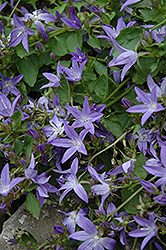>> Home
Height: 6 inches
Spread: 24 inches
Sunlight:
![]()
![]()
Hardiness Zone: 2a
Description:
This showy, dwarf species displays a sea of stunning blue star flowers against a backdrop of lush green foliage; a fast vigorous grower that is great for groundcover or rock gardens; may tend to smother delicate alpine plants
Ornamental Features
Serbian Bellflower is smothered in stunning blue star-shaped flowers at the ends of the stems from late spring to mid summer. Its small round leaves remain green in colour throughout the season.
Landscape Attributes
Serbian Bellflower is an herbaceous perennial with a ground-hugging habit of growth. Its relatively fine texture sets it apart from other garden plants with less refined foliage.
This plant will require occasional maintenance and upkeep, and is best cleaned up in early spring before it resumes active growth for the season. Gardeners should be aware of the following characteristic(s) that may warrant special consideration;
- Spreading
Serbian Bellflower is recommended for the following landscape applications;
- Mass Planting
- Border Edging
- General Garden Use
- Groundcover
- Container Planting
Planting & Growing
Serbian Bellflower will grow to be only 6 inches tall at maturity, with a spread of 24 inches. Its foliage tends to remain low and dense right to the ground. It grows at a fast rate, and under ideal conditions can be expected to live for approximately 5 years. As an herbaceous perennial, this plant will usually die back to the crown each winter, and will regrow from the base each spring. Be careful not to disturb the crown in late winter when it may not be readily seen!
This plant does best in full sun to partial shade. It is very adaptable to both dry and moist locations, and should do just fine under typical garden conditions. It is not particular as to soil type or pH. It is highly tolerant of urban pollution and will even thrive in inner city environments. This species is not originally from North America. It can be propagated by division.
Serbian Bellflower is a fine choice for the garden, but it is also a good selection for planting in outdoor pots and containers. Because of its spreading habit of growth, it is ideally suited for use as a 'spiller' in the 'spiller-thriller-filler' container combination; plant it near the edges where it can spill gracefully over the pot. Note that when growing plants in outdoor containers and baskets, they may require more frequent waterings than they would in the yard or garden. Be aware that in our climate, most plants cannot be expected to survive the winter if left in containers outdoors, and this plant is no exception. Contact our experts for more information on how to protect it over the winter months.
